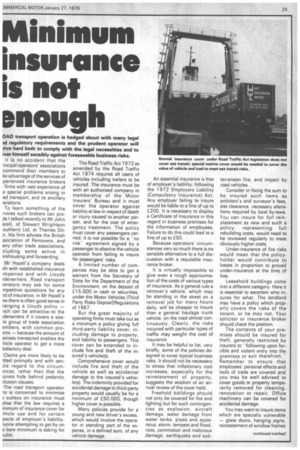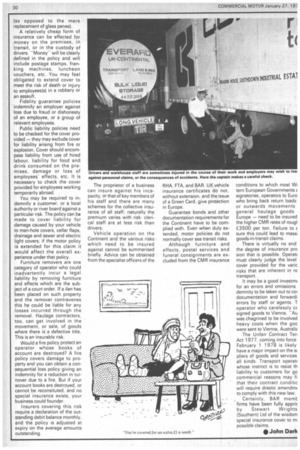Minimum insurance is not onough
Page 31

Page 32

If you've noticed an error in this article please click here to report it so we can fix it.
OAD transport operation is hedged about with many legal id regulatory requirements and the prudent operator will rive hard both to comply with the legal necessities and to iver himself sensibly against foreseeable business risks.
It is no accident that the .incipal operators' associations commend their members to ke advantage of the services of :perienced insurance brokers firms with vast experience of e special problems arising in ad transport, and its ancillary )erations.
To learn something of the Tvices such brokers can prode I talked recently to Mr John azell, of Stewart Wrightson outhern) Ltd, at Thames Ditn, His firm advises the British ;sociation of Removers, and any other trade associations, cluding some active in .rehousing and forwarding.
Mr HazeII's company deals ith with established insurance ■ mpanies and with Lloyds Iderwriters. Road transport ierators may ask for some mpetitive quotations for any id of insurance: in Mr HazeII's
there is often good sense in ranging a Lloyds policy — iich can be attractive-to the iderwriters if it covers a sizele group of trade association embers, with common pro?ms — because the amount of isiness transacted enables the hide operator to get a more tisfactory deal.
Claims are more likely to be ttled promptly and with senzble regard to the circuminces, rather than that the ;urers hide behind pedantic. clusion clauses.
The road transport operator io is concerned to minimise 3 outlays on insurance must 3lise that the law requires a inimum of insurance cover for !hide use and for certain pects of employer's liability. wone attempting to get by on e bare minimum is asking for )uble.
The Road Traffic Act 1972 as amended by the Road Traffic Act 1974 requires all users of vehicles including trailers to be insured. The insurance must be with an authorised company in membership of the Motor Insurers' Bureau and it must cover the operator against liability at law in respect of death or injury caused to another person, and for the cost of emergency treatment. The policy must cover any passengers carried; it is not possible for a -no risk" agreement signed by a passenger to absolve the vehicle operator from failing to insure for passengers' risks.
A limited number of companies may be able to get a warrant from the Secretary of State for the Department of the Environment, on the deposit of £15,000 in cash or securities, under the Motor Vehicles (Third Party Risks Deposit)Regulations of 1967.
But the great majority of operating firms must take out as a minimum a policy giving full third-party liability cover, including damage to property, and liability to passengers. This cover can be extended to include fire and theft of the insured's vehicle(s).
Comprehensive cover would include fire and theft of the vehicle as well as accidental damage to the insured's vehicle(s). The indemnity provided for accidental damage to third-party property would usually be for a minimum of £50,000, though higher cover is possible.
Many policies provide for a young and new driver's excess, which would involve the operator in standing part of the expense, in a defined sum, of any vehicle damage. An essential insurance is that of employer's liability, following the 1972 Employers Liability (Compulsory Insurance) Act. Any employer failing to insure would be liable to a fine of up to £200. It is necessary to display a Certificate of Insurance in this regard in business premises for the information of employees. Failure to do this could lead to a fine of up to £50.
Because operators' circumstances vary so much there is no sensible alternative to a full dis-• .cussion with a reputable insurance broker.
It is virtually impossible to give even a rough approximation of the costs of various types of insurance. As a general rule a remover's vehicle, which may be standing in the street on a removal job for many hours daily, will be cheaper to insure than a general haulage trunk vehicle, on the road almost continuously. Clearly, the risks incurred with particular types of traffic may weight the cost of insurance.
It may be helpful to list, very briefly, some of the policies designed to cover typical business risks. It should not be necessary to stress that inflationary cost increases, especially for the reinstatement of property, suggests the wisdom of an annual review of the cover held.
Freehold buildings should not only be covered for fire and lighting but for such contingencies as explosion, aircraft damage, water damage from water tanks, pipes and apparatus, storm, tempest and flood, riots, commotion and malicious damage, earthquake and sub terranean fire, and impact by road vehicles.
Consider in fixing the sum to be insured such items as architect's and surveyor's fees, site clearance, necessary alterations required by local by-laws. You can insure for full reinstatement as new and such a policy, representing full rebuilding costs, would need to be reviewed regularly to meet obviously higher costs.
Under-insurance of fire risks would mean that the policyholder would contribute to losses in proportion to proved under-insurance at the time of loss.
Leasehold buildings come into a different category. Here it is essential to ascertain who insures for what. The landlord may have a policy which properly covers the risks of the tenant, or he may not. Your solicitor or insurance broker should check the position.
The contents of your premises should be insured for theft, generally restricted by insurers to -following upon forcible and violent entry into the premises or exit therefrom.' Remember to ensure that employees' personal effects and tools of trade are covered and you may be well advised to cover goods or property temporarily removed for cleaning, renovation or repair. Office machinery can be covered for accidental damage.
You may want to insure items which are specially vulnerable — glass doors, hanging signs, reinstatement of window frames (as opposed to the mere replacement of glass panes).
A relatively cheap form of insurance can be effected for money on the premises, in transit, or in the custody of drivers. -Moneywill be clearly defined in the policy and will include postage stamps, franking machines, luncheon vouchers, etc. You may feel obligated to extend cover to meet the risk of death or injury to employees(s) in a robbery or an assault.
Fidelity guarantee policies indemnify an employer against loss due to fraud or dishonesty of an employee, or a group of relevant employees.
Public liability policies need to be checked for the cover provided — they may exclude cover for liability arising from fire or explosion. Cover should encompass liability from use of hired labour, liability for food and drink consumed on the premises, damage or loss of employees' effects, etc. It is necessary to check the cover provided for employees working temporarily abroad.
You may be required to indemnify a customer, or a local authority or river board against a particular risk. The policy can be made to cover liability for damage caused by your vehicle to man-hole covers, cellar flaps, drainage and sewer and electric light covers; if the motor policy is extended for this claim it would affect the overall experience under that policy.
Furniture removers are one category of operator who could inadvertently incur a legal liability by removing furniture and effects which are the sub ject of a court order. If a lien has been placed on such property and the remover contravenes this he could be liable for any losses incurred through the removal. Haulage contractors, too, can get involved in the movement, or sale, of goods where there is a defective title. This is an insurable risk.
Would a fire policy protect an operator whose books of account are destroyed? A fire policy covers damage to property and you can obtain a con sequential loss policy giving an indemnity for a reduction in turnover due to a fire. But if your account books are destroyed, or cannot be reconsituted, and no special insurance exists, your business could founder_ Insurers covering this risk require a declaration of the out standing debit balance monthly, and the policy is adjusted at expiry on the average amounts outstanding.
The proprietor of a business can insure against his incapacity, or that of key members of his staff and there are many schemes for the collective insurance of all staff; naturally the premium varies with risk: clerical staff are at less risk than drivers.
Vehicle operation on the Continent and the various risks which need to be insured against cannot be summarised briefly. Advice can be obtained from the specialist officers of the RHA, FTA, and BAR. UK vehicle insurance certificates do not, without extension, and the issue of a Green Card, give protection in Europe.
Guarantee bonds and other documentation requirements for the Continent have to be complied with. Even when duly extended, motor policies do not normally cover sea transit risks.
Although furniture and effects, postal services and funeral consignments are excluded from the CMR insurance
conditions to which most WI tern 'European Governments z signatories, operators to Euro who bring back return loads or outwards movements general haulage goods Europe — need to be insured the higher CMR rates of rougl £3500 per ton. Failure to E sure this could lead to massi goods-in-transit claims.
There is virtually no end the degree of insurance pro sion that is possible. Operat( must clearly judge the level cover provided for the varic risks that are inherent in ro transport.
It may be a good investmE for an errors and omissions demnity to be taken out to cm documentation and forvvardi errors by staff or agents_ T operator who carelessly cc signed goods to Vienna, -Au was chagrined to be involved heavy costs when the goo were sent to Vienna, AustraliE
The Unfair Contract Ten Act 1977, coming into force February 1 1978 is likely have a major impact on the si pliers of goods and services all kinds. Transport operat( whose instinct is to resist th liability to customers for go commercial reasons may fi that their contract conditic will require drastic amendmE to comply with this new law.
Certainly, BAR mom!: firms have been fully appri: by Stewart Wrights (Southern) Ltd of the wisdom special insurance cover to mi possible claims.
• John Dark




















































































































